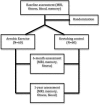Exercise training increases size of hippocampus and improves memory
- PMID: 21282661
- PMCID: PMC3041121
- DOI: 10.1073/pnas.1015950108
Exercise training increases size of hippocampus and improves memory
Abstract
The hippocampus shrinks in late adulthood, leading to impaired memory and increased risk for dementia. Hippocampal and medial temporal lobe volumes are larger in higher-fit adults, and physical activity training increases hippocampal perfusion, but the extent to which aerobic exercise training can modify hippocampal volume in late adulthood remains unknown. Here we show, in a randomized controlled trial with 120 older adults, that aerobic exercise training increases the size of the anterior hippocampus, leading to improvements in spatial memory. Exercise training increased hippocampal volume by 2%, effectively reversing age-related loss in volume by 1 to 2 y. We also demonstrate that increased hippocampal volume is associated with greater serum levels of BDNF, a mediator of neurogenesis in the dentate gyrus. Hippocampal volume declined in the control group, but higher preintervention fitness partially attenuated the decline, suggesting that fitness protects against volume loss. Caudate nucleus and thalamus volumes were unaffected by the intervention. These theoretically important findings indicate that aerobic exercise training is effective at reversing hippocampal volume loss in late adulthood, which is accompanied by improved memory function.
Conflict of interest statement
The authors declare no conflict of interest.
Figures





Comment in
-
Failure to demonstrate that memory improvement is due either to aerobic exercise or increased hippocampal volume.Proc Natl Acad Sci U S A. 2011 May 3;108(18):E89; author reply E90. doi: 10.1073/pnas.1102593108. Epub 2011 Apr 19. Proc Natl Acad Sci U S A. 2011. PMID: 21504947 Free PMC article. No abstract available.
-
Both the body and brain benefit from exercise: potential win-win for Parkinson's disease patients.Mov Disord. 2011 Mar;26(4):607. doi: 10.1002/mds.23726. Mov Disord. 2011. PMID: 21506145 No abstract available.
References
-
- Raz N, et al. Regional brain changes in aging healthy adults: General trends, individual differences and modifiers. Cereb Cortex. 2005;15:1676–1689. - PubMed
-
- Hillman CH, Erickson KI, Kramer AF. Be smart, exercise your heart: Exercise effects on brain and cognition. Nat Rev Neurosci. 2008;9:58–65. - PubMed
-
- Cotman CW, Berchtold NC. Exercise: A behavioral intervention to enhance brain health and plasticity. Trends Neurosci. 2002;25:295–301. - PubMed

